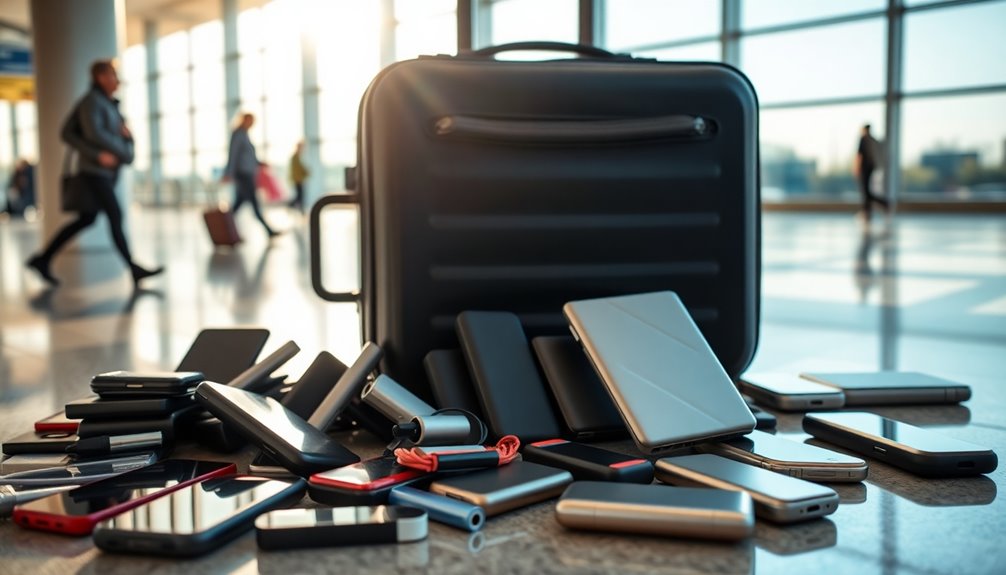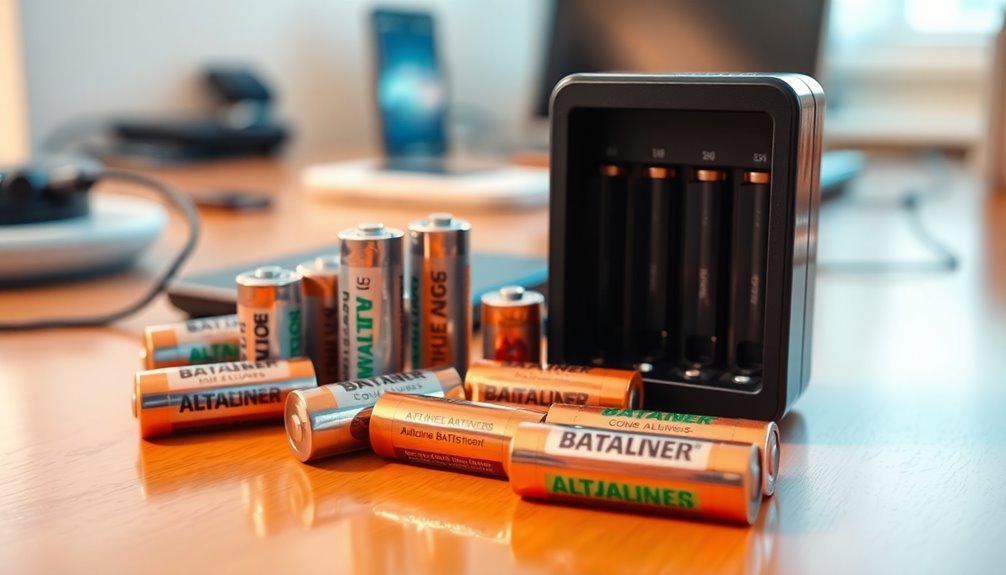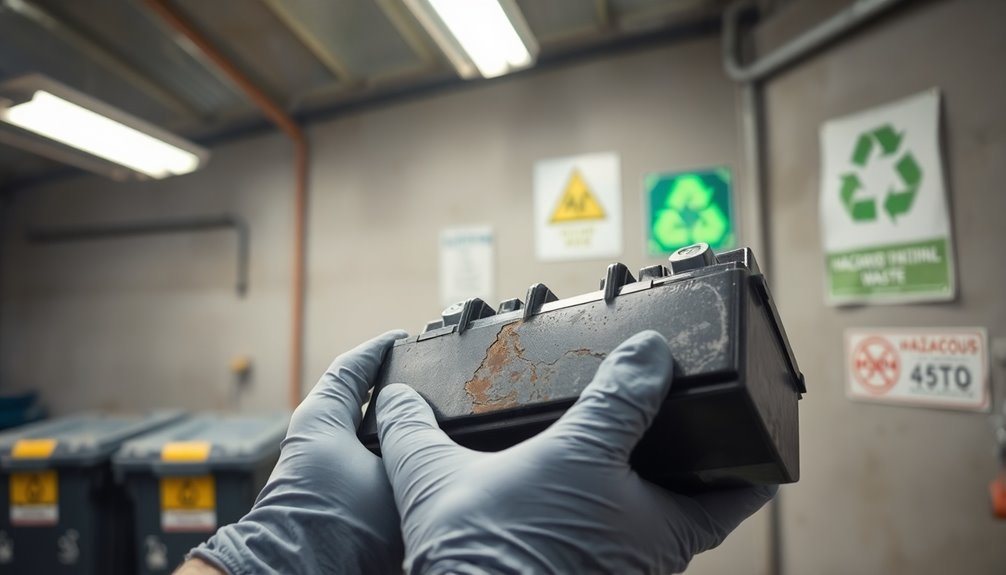You can fly with lithium batteries, but you need to follow strict rules. Spare lithium batteries must stay in your carry-on luggage, while devices with batteries can go in both checked and carry-on bags. If your battery exceeds 100 watt-hours, you'll need airline approval. Be sure to pack batteries in protective cases to avoid short circuits, and check your specific airline's guidelines for any additional restrictions. To keep your journey hassle-free and safe, understanding these rules is essential. There's a lot more to explore about traveling with lithium batteries, and knowing the details can make your trip smoother.
Key Takeaways
- Lithium batteries must be carried in carry-on baggage; spare batteries are not allowed in checked luggage.
- Batteries rated under 100 watt-hours do not require airline approval for transport.
- For batteries between 100-160 watt-hours, explicit airline approval is necessary before travel.
- Use original packaging or protective pouches to prevent short circuits and damage during transport.
- Always check airline-specific regulations and international guidelines before flying with lithium batteries.
Risks of Lithium Batteries in Air Travel
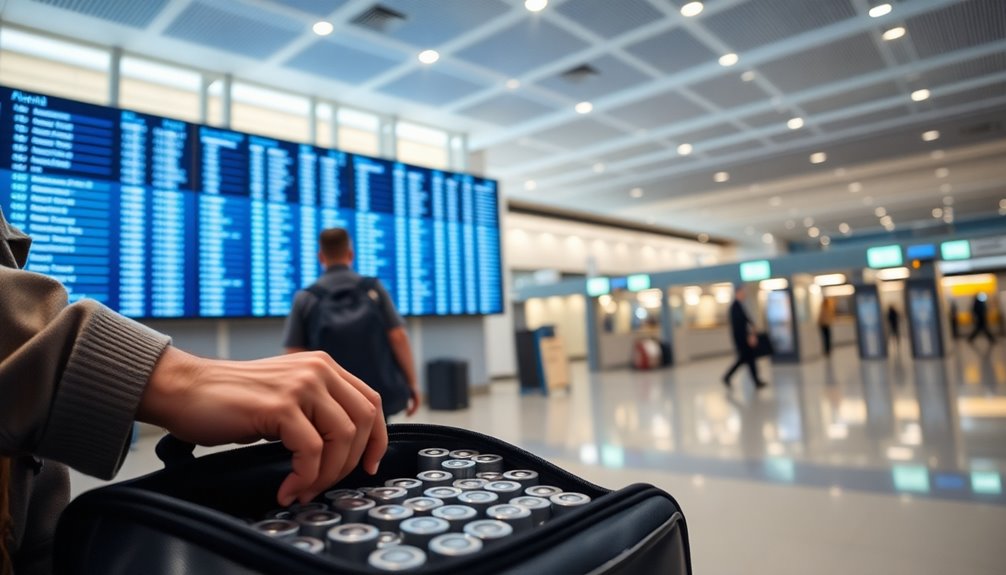
When you're traveling by air, it's essential to understand the risks associated with lithium batteries. These batteries, while powerful, pose a significant fire risk due to potential thermal runaway, overheating, or short circuits.
Incidents like the UPS cargo plane fire have underscored the dangers they present. To mitigate this risk, FAA regulations require you to keep devices with lithium batteries in your carry-on luggage. Spare batteries must also be protected from short circuits and can't be placed in checked baggage.
If your batteries are rated under 100 watt-hours, you can transport them without airline approval; however, those rated between 100-160 watt-hours need explicit permission.
Staying informed helps you travel safely while minimizing fire hazards linked to lithium batteries.
U.S. Regulations for Lithium Batteries
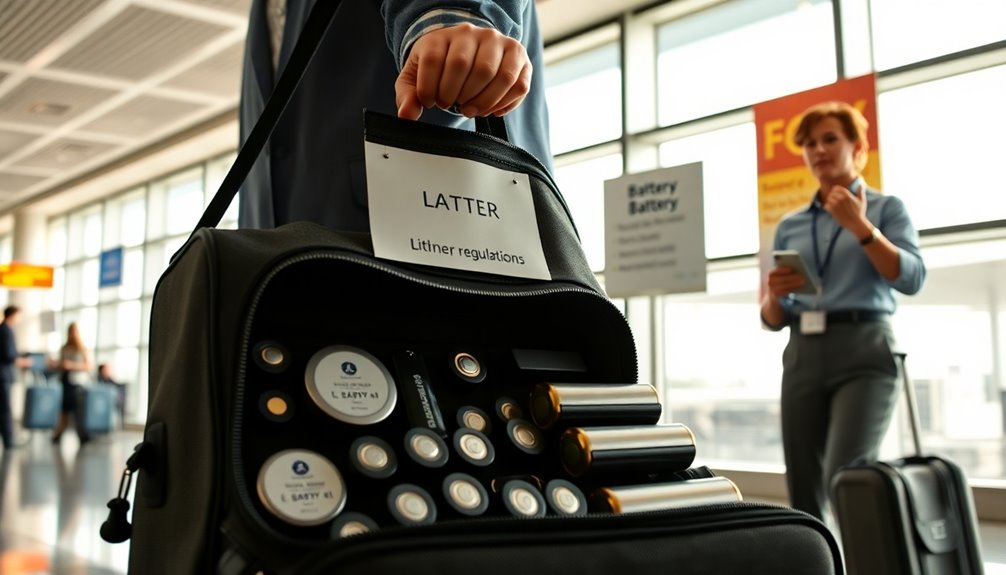
Understanding U.S. regulations for lithium batteries is essential for safe air travel.
You can transport installed lithium-ion batteries in both carry-on baggage and checked luggage. However, spare lithium batteries must only go in your carry-on.
If your spare lithium-ion batteries are under 100 watt-hours, you don't need prior airline approval, but those between 100-160 watt-hours require clearance.
Always store loose lithium batteries in protective cases to prevent short circuits, as they're prohibited in checked luggage. The Federal Aviation Administration (FAA) recommends covering battery terminals with tape for added safety.
Remember to check the Transportation Security Administration (TSA) and your airline's specific regulations before flying, as compliance is vital for safety and avoiding penalties.
International Regulations and Compliance
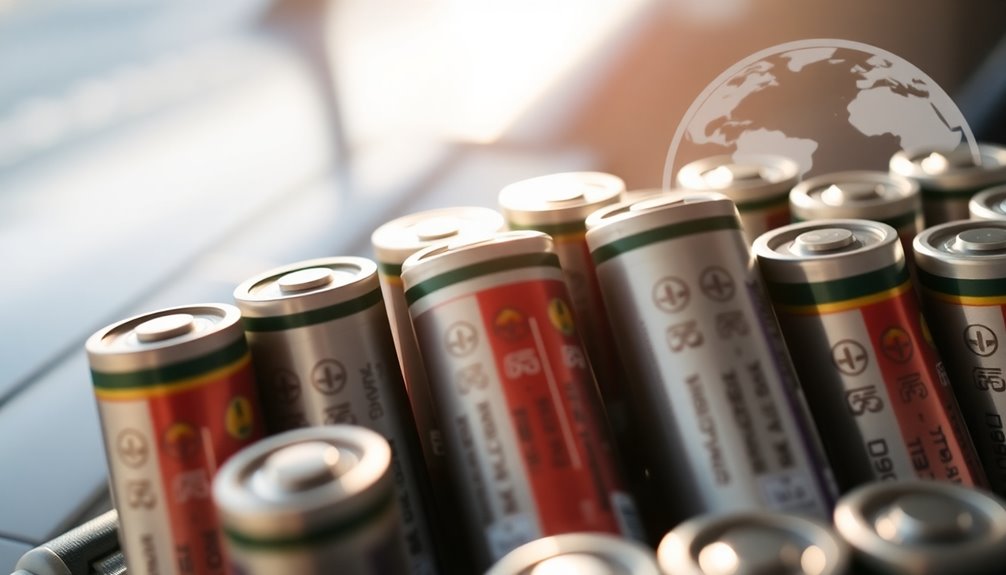
While international regulations for lithium batteries generally follow IATA standards, they can differ considerably by country, so you must check the specific laws of your destination before flying.
The European Union insists that devices with lithium batteries be carried in hand luggage, while batteries over 100 watt-hours need airline approval for transport.
In countries like Japan and South Korea, strict compliance is vital for checked baggage, or you risk penalties.
Familiarizing yourself with FAA guidelines and TSA regulations is essential to avoid fines or confiscation.
Always verify you're aware of airline-specific policies regarding the transport of lithium batteries.
Utilizing resources from the FAA and TSA can help you take the necessary safety precautions for a smooth journey.
Packing Lithium Batteries Safely
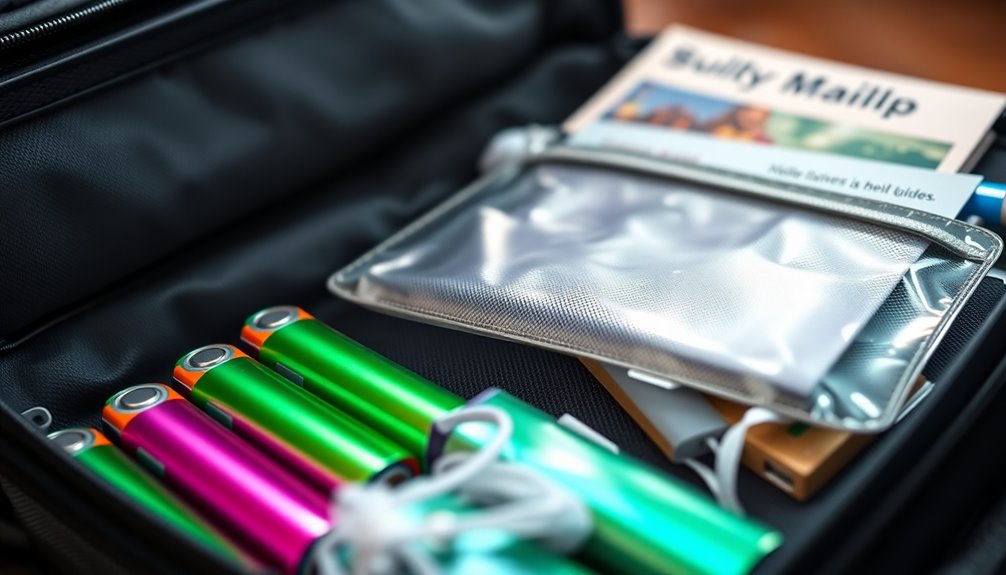
Packing lithium batteries safely is essential for guaranteeing a smooth travel experience.
Always use the original packaging or protective pouches when packing lithium batteries to keep them protected from short circuits and damage. To prevent accidental activation, tape the terminals of your batteries.
If you have loose batteries, store them in plastic cases or bags to avoid contact with metal objects that could bridge terminals. Before traveling, verify all batteries are fully charged or completely powered off to minimize risks during the flight.
Additionally, check airline-specific restrictions regarding wattage limits and the number of batteries allowed in your carry-on luggage. Following these guidelines helps you comply with transportation security measures and travel hassle-free.
Handling Batteries at the Airport

When you arrive at the airport, handling your lithium batteries properly is just as important as packing them safely.
Installed batteries in devices are allowed in both carry-on or checked luggage, but spare batteries must be stored in your carry-on bags. To prevent short circuits, protect spare lithium batteries in their original packaging or plastic cases, and tape the terminals if possible.
During security checks, be ready to remove batteries from your bags for inspection, especially if they exceed 100 watt-hours, which might need special handling by TSA agents.
Keep your lithium batteries accessible in your carry-on, and make sure all devices are powered off to minimize risks. Always check your airline regulations for specific rules regarding lithium batteries.
Emergency Procedures During Flights
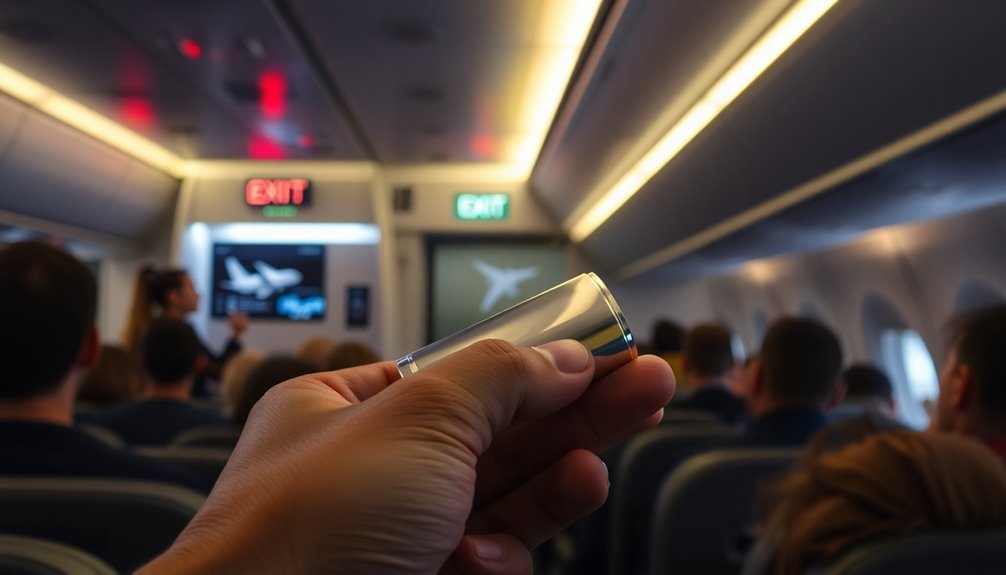
In the event of a lithium battery emergency during a flight, it's vital to stay calm and follow the crew's instructions.
Flight attendants are trained to handle battery-related incidents, including lithium battery fires, using specialized fire containment bags. If a battery fire occurs, the crew may initiate an emergency landing to guarantee everyone's safety.
Always pay close attention to crew instructions during these situations; your cooperation is significant.
Should you or someone else experience battery-related injuries, crew members can provide immediate assistance and are trained in basic first aid.
Regularly reviewing emergency procedures related to lithium batteries can help you stay prepared and respond quickly if an incident arises, ultimately promoting a safer travel experience.
Best Practices for Safe Travel
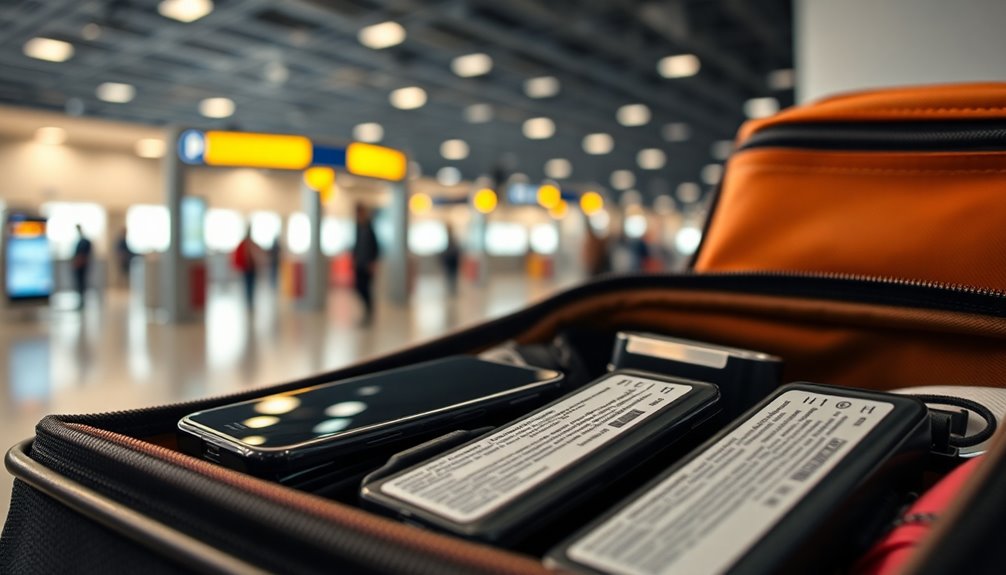
When traveling, make certain to pack your spare lithium batteries safely in your carry-on.
Always handle your devices carefully and power them off before checking in to avoid any issues at security.
Familiarizing yourself with airport security preparation tips can help guarantee a smooth journey.
Packing Spare Batteries Safely
To guarantee your spare lithium batteries are packed safely for travel, always place them in your carry-on luggage rather than checked baggage. This complies with regulations set for carrying lithium batteries and minimizes potential risks.
Follow these best practices:
- Use original packaging: It's designed to keep your batteries protected during transport.
- Store loose batteries securely: Use protective cases or plastic bags to prevent short circuits.
- Tape battery terminals: This adds an extra layer of safety against accidental connections.
- Check airline restrictions: Different airlines may have specific rules regarding the number and wattage of spare batteries allowed.
Handling Devices During Travel
Packing spare batteries safely is just one part of guaranteeing your journey goes smoothly. Always keep your lithium ion battery-powered devices in your carry-on luggage, making them easily accessible for security checks.
During air travel, make sure all devices are powered off or in sleep mode to reduce the risk of overheating and potential battery fires. Protect your spare rechargeable batteries by storing them in their original packaging or protective pouches to prevent short circuits.
Familiarize yourself with airline-specific regulations regarding battery transport, as restrictions may vary based on wattage. Throughout the flight, monitor devices for any signs of overheating or damage, and if you notice anything concerning, report it to flight attendants immediately.
Airport Security Preparation Tips
How can you guarantee a smooth experience at airport security with your lithium batteries? Proper preparation is key to ensuring a safe journey. Follow these tips to handle lithium batteries effectively:
- Keep batteries accessible: Store them in your carry-on for easier inspection by TSA.
- Use protective pouches: Always place spare lithium batteries in protective packaging to prevent short circuits and potential fire hazards.
- Tape terminal ends: As the FAA recommends, tape the terminals of loose batteries to avert accidental activation.
- Know your watt-hours: Be ready to inform TSA agents about any battery exceeding 100 watt-hours for special handling.
Frequently Asked Questions
What Happens if TSA Finds Lithium Battery in Checked Bag?
If TSA finds a lithium battery in your checked bag, it may get confiscated, as spare lithium batteries aren't allowed in checked luggage.
They might flag your bag for further inspection, which can delay your travel plans. You could even face fines or penalties for trying to transport loose batteries this way.
To avoid these issues, make sure you carry all lithium batteries in your hand luggage instead.
What Is the New Rule for Lithium Batteries?
The new rule for lithium batteries is essential—it's like a firework waiting to explode if not handled correctly!
You've got to carry spare lithium batteries in your carry-on luggage, ensuring they're protected from short circuits.
Batteries under 100 watt-hours don't need airline approval, but those between 100-160 watt-hours do.
Always store loose batteries in protective cases, and remember, damaged or recalled batteries aren't allowed on planes.
Stay safe while flying!
Can You Put a Lithium Battery in Your Luggage or Carry-On?
You can put a lithium battery in your luggage, but there are some rules to follow.
If it's installed in a device, you can pack it in both checked or carry-on bags. However, spare lithium batteries must be in your carry-on.
Make sure they're stored in protective cases to prevent short circuits, and check the watt-hour capacity—batteries under 100 watt-hours don't need prior approval, but larger ones do.
Can Airport Scanners Detect Lithium Batteries?
Yes, airport scanners can detect lithium batteries.
When you pass through security, the X-ray machines differentiate materials based on density, allowing them to spot these batteries in your luggage.
If you've got loose or spare batteries, expect additional screening. Security personnel might ask you to remove devices with lithium batteries for a clearer view.
Some advanced scanners can even determine the wattage, ensuring everything complies with safety regulations.
Conclusion
In summary, flying with lithium batteries doesn't have to be a hassle if you know the rules. Did you know that over 80% of air travel incidents related to batteries occur due to improper packing? By following the regulations and best practices outlined, you can guarantee a safe journey for yourself and everyone on board. So, double-check your batteries before heading to the airport, and travel smart! Your safety—and that of others—depends on it.

